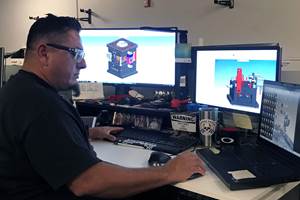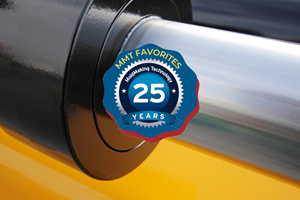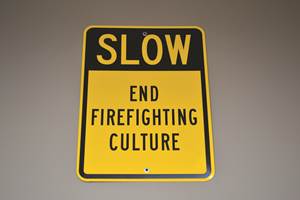A Workforce Development Solution: The SPI Apprentice Training Grant Program
One of the biggest problems facing the plastics industry today is the shortage of qualified labor
One of the biggest problems facing the plastics industry today is the shortage of qualified labor. In publications and conversations, stories abound concerning the lack of workers, the poor quality of the pool of available employees, the sometimes negative image of manufacturing jobs in general, and companies whose growth is limited by their inability to staff facilities.
The Society of the Plastics Industry, Inc. - the plastics industry trade association - has a comprehensive range of programs under-way to provide workforce development solutions to its members and the larger industry. In this column, we will look at one aimed directly at moldmaking: The SPI Apprentice Training Grant Program.
Established in 1998 by SPI's Moldmakers Division, this program works to promote the growth and advancement of the U.S. moldmaking industry. Through this effort, awards of up to $1000.00 per year are made to selected institutions or organizations - in-house training programs provided by a moldmaking business are not eligible for grant funding.
Institutions and organizations seeking the grant must provide the SPI Moldmakers Division Policy Board with written/published material or information on the scope, purpose and objective of the program. All requests are reviewed by the Policy Board, which gives awards to successful applicants. Those accepted into the program must reapply each year.
Organizations and institutions receiving grants through the third quarter of 1999 were the Iowa Plastics Consortium; the Leominster (MA) High School Center for Technical Education; the National Institute for Metalworking Skills in Reston, VA; The Tooling Skills Institute of Greeneville, TN; Fontana (CA) High School; Estancia High School in Costa Mesa, CA; and The Orange Coast College Machine Technology Department in Costa Mesa. A number of these grant recipients received matching funds from the SPI Western Moldmakers Division.
"Our members already are working with many of these institutions in other ways," explains Walt Bishop, executive director of the SPI Moldmakers Division. "Some have provided equipment, some have donated their time and some actually have helped get training programs off the ground across the country. We saw the Grant Program as a way to build on this support, by encouraging these institutions, helping them establish credibility as grant recipients and supplementing their resources."
Also in support of workforce development, SPI offers a number of moldmaking publications free to training institutions and organizations. Available for purchase by companies, as well, these publications include the following:
- AR-108: Introduction to Moldmaking. This textbook, created through a cooperative effort of the major trade groups in the moldmaking industry, introduces new entrants to the basics of the moldmaking process. It is intended for the first-year apprentice or student moldmaker. It also is suitable for engineers, managers, buyers and others who need an orientation to the technology of building molds for plastics or rubber.
- AR-111: The Future Is In Your Hands, Part One - Model Curriculum for Classroom Instruction. This classroom model curriculum outlines the "Related Theory" instruction needed to be a moldmaker.
- AR-112: The Future Is In Your Hands, Part Two - Hands-On Training Manual and Apprentice Logbook. This publication provides a step-by-step training program for skill development that can be used in the moldmaking facility or the school shop.
- AR-113: The Future Is In Your Hands, Parts One and Two.
"Many people have a stereotypical view of manufacturing," Bishop says. "Young people, and their parents, don't know that moldmaking companies provide good work environments, that computers are an integral part of the process these days and that trained moldmakers can earn as much as - or more than - college graduates in some fields."
That's why, he explains, the Division's members carry their positive message to the community and its youth at every opportunity. That's also why they're working hard to encourage training programs that are preparing tomorrow's moldmakers.
Bishop adds that the SPI Moldmakers Division will continue to develop and operate programs to foster workforce development.
"Everybody wins in programs such as these," Bishop states. "Industry gets the workers it needs and workers get good jobs with bright futures. "Ask some of the owners of the companies in our Division where they started," he continues, "and they'll tell you they began on the shop floor. That gives you some idea of the sort of opportunity the industry offers and that's the word we need to spread."
Related Content
Mold Design Review: The Complete Checklist
Gerardo (Jerry) Miranda III, former global tooling manager for Oakley sunglasses, reshares his complete mold design checklist, an essential part of the product time and cost-to-market process.
Read MoreHow to Correctly Size a Hydraulic Cylinder
This week Randy shares steps for correctly sizing a hydraulic cylinder on a mold.
Read MoreHands-on Workshop Teaches Mold Maintenance Process
Intensive workshop teaches the process of mold maintenance to help put an end to the firefighting culture of many toolrooms.
Read MoreMaking Quick and Easy Kaizen Work for Your Shop
Within each person is unlimited creative potential to improve shop operations.
Read MoreRead Next
Working To End Manufacturing's Labor Shortage
Members of the American Machine Tool Distributors' Association (AMTDA), who provide manufacturing solutions through applications, sales and service of machine tools, note a great deal of frustration in the marketplace. The statement from manufacturing customers that, "I'd buy another machine if it came with an operator!" is all too familiar.
Read MoreHow to Use Strategic Planning Tools, Data to Manage the Human Side of Business
Q&A with Marion Wells, MMT EAB member and founder of Human Asset Management.
Read More
.jpg;maxWidth=150;quality=70)













.jpg;maxWidth=400;quality=70)

